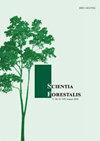Plant production of Ocotea odorifera (Vell.) Rohwer by the micro-propagation technique
IF 0.4
4区 农林科学
Q4 FORESTRY
引用次数: 0
Abstract
Due to the intense exploitation of its essential oil over the years, Ocotea odorifera was included in the endangered species in Brazil. In this context, the micro-propagation technique is an alternative to sexual propagation, and consequently, it favors the conservation of the species. Thus, the objective of this study was to produce seedlings of O. odorifera through the micro-propagation technique. Seed collection was carried out in mother trees distributed in a natural stand. In vitro cultivation was divided into three phases: (i) in vitro germination and establishment; (ii) elongation and rooting and (iii) acclimatization. For explant disinfestation, a 3x2 factorial was used: three sources of propagules (seed, embryo and nodal segment) combined with two immersion times in NaClO (50%) (5 and 10 min), totaling 6 treatments. In the in vitro establishment, two culture media (MS supplemented with ANA and BAP) combined with or without the addition of activated charcoal were tested. In the elongation and rooting phase, the presence and absence of activated charcoal in the development of shoots was evaluated. For the acclimatization of seedlings and shoots, two ex vitro conditions were evaluated: in a growth room environment and in a nursery. We found significant differences between the evaluated treatments. The embryo-type propagule source and disinfested with 50% NaClO for 10 minutes showed the best morphological characteristics of germination and development. The addition of charcoal to basic MS medium, and free from plant regulators, reduced tissue oxidation in the elongation and rooting phase. Shoots of Ocotea odorifera developed in vitro and adapted well to ex vitro acclimatization conditions. Therefore, the micro-propagation protocol used in this work was efficient, providing the production of healthy and suitable seedlings for field conditions.香果茶的植物生产采用微繁殖技术
由于多年来对其精油的大量开采,巴西已将其列为濒危物种。在这种情况下,微繁殖技术是有性繁殖的一种替代方法,因此有利于物种的保护。因此,本研究的目的是利用微繁技术育苗。在分布于自然林分的母树上采集种子。体外培养分为三个阶段:(1)体外萌发和建立;(ii)伸长和生根;(iii)驯化。外植体除虫采用3 × 2因子:3种繁殖体来源(种子、胚和节段)结合2次NaClO(50%)浸泡(5和10 min),共6次处理。在体外培养中,对两种培养基(MS加ANA和BAP)加活性炭或不加活性炭进行了测试。在伸长期和生根期,对活性炭的存在和不存在进行了评价。对于幼苗和芽的适应,评估了两种离体条件:生长室内环境和苗圃环境。我们发现在评估的治疗方法之间存在显著差异。胚型繁殖体源和50% NaClO处理10 min的萌发发育形态特征最好。在基本的MS培养基中添加木炭,并且不含植物调节剂,可以减少伸长和生根阶段的组织氧化。在离体驯化条件下,香果茎部发育良好,适应良好。因此,本研究中采用的微繁方案是高效的,为田间条件提供了健康适宜的幼苗生产。
本文章由计算机程序翻译,如有差异,请以英文原文为准。
求助全文
约1分钟内获得全文
求助全文
来源期刊

Scientia Forestalis
Agricultural and Biological Sciences-Forestry
CiteScore
1.00
自引率
0.00%
发文量
39
期刊介绍:
Scientia Forestalis is a scientific publication of the IPEF – Institute of Forest Research and Studies, founded in 1968, as a nonprofit institution, in agreement with the LCF – Department of Forest Sciences of the ESALQ – Luiz de Queiroz College of Agriculture of the USP – São Paulo University. Scientia Forestalis, affiliated to the ABEC – Brazilian Association of Scientific Publishers, publishes four issues per year of original papers related to the several fields of the Forest Sciences.
The Editorial Board is composed by the Editor, the Scientific Editors (evaluating the manuscript), and the Associated Editors (helping on the decision of acceptation or not of the manuscript, analyzed by the Peer-Reviewers.
 求助内容:
求助内容: 应助结果提醒方式:
应助结果提醒方式:


